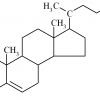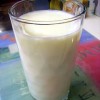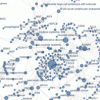Posts tagged mutations

Bad Cholesterol
Apr 12th
When someone mentions cholesterol many will say, how is your HDL? Cholesterol travels through the blood attached to lipoproteins. From a health prospective we try to maintain the good cholesterol (High density lipoproteins or HDL) and decrease the bad cholesterol (Low density lipoproteins or LDL). The HDL aids the body in removal of bad cholesterol in the blood whereas LDL causes build up of plaque within arteries restricting blood flow and hardening of the arteries that may result in heart disease. Control of cholesterol levels is through a number of ways such as low cholesterol diets, weight loss and drugs.
Cholesterol More >

Evolution – Got Milk?
Feb 17th
After asking students during a lesson on mutations if it is possible that a mutation in DNA could be good, most students will nod yes without much understanding. Recently, I finally had one student raise his hand immediately and answer the question (with extreme surprise that no other students were blurting out the answer)…”evolution!” He was able to make the connection between changes in DNA that are building up over time, and how that change can possibly make that organism better in some way. If it helps the survival of an organism, that mutation is going to stick around and More >

One Size Does Not Fit All
Nov 11th
In 1994, there were more than 2.2 million serious medical cases, and over 100,000 deaths from negative reactions to prescribed drugs. (NCBI) These numbers have made adverse drug reactions one of the leading causes of hospitalization and deaths in the US. Currently, there is no easy way to determine how a patient is going to respond to a medication, so pharmaceutical companies are relying on a “one size fits all” policy. But as we can see with the amount of hospitalizations and deaths each year, there has to be a better way. One area that is shedding hope on this More >

Cancer Genomics: so many mutations!
Feb 18th
The human genome is the complete collection of over three billion bases in each of our cells. Cancers accumulate multiple changes, or mutations, in their DNA that contribute to the disease by changing how cells behave. For instance, cancers need nutrients to grow. Very often, they get these nutrients by producing signals that encourage new blood vessel formation. Finding the mutations that lead to cancer is very difficult. For one thing, even for cancers that affect the same tissue and look similar, the mutations can be very different. Also, one of the hallmarks of cancer is an increased rate of More >

Addicted cancers
Jun 9th
Most people know that smoking is a hard habit to kick because smokers become addicted to the nicotine and habit. Equally sad is the tendency of young adolescents to start smoking for social and psychological reasons.
In a turn-around of sorts, it may be comforting to know that cancers can become addicted, too. Cancer cells have many different genetic changes, as well as changes in the expression of genes that are not due to mutations called epigenetic changes. Although cancer cells do have many differences from normal cells, they are still very similar to normal cells, making it very difficult to More >
